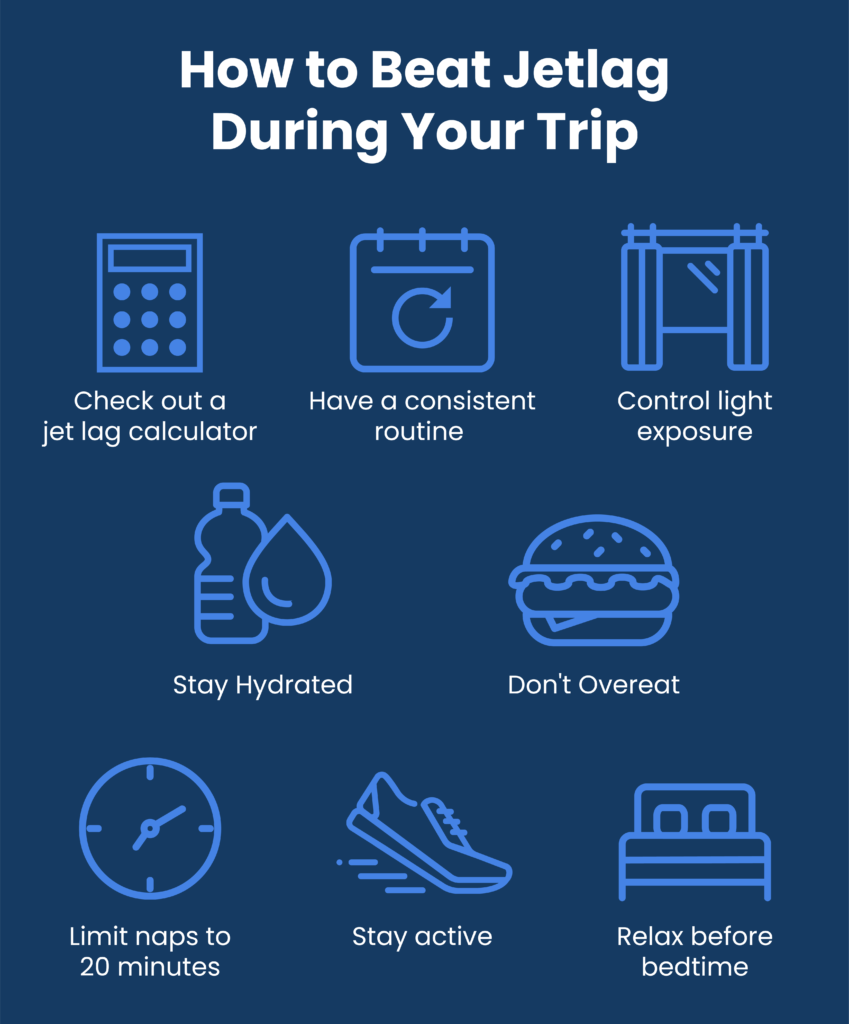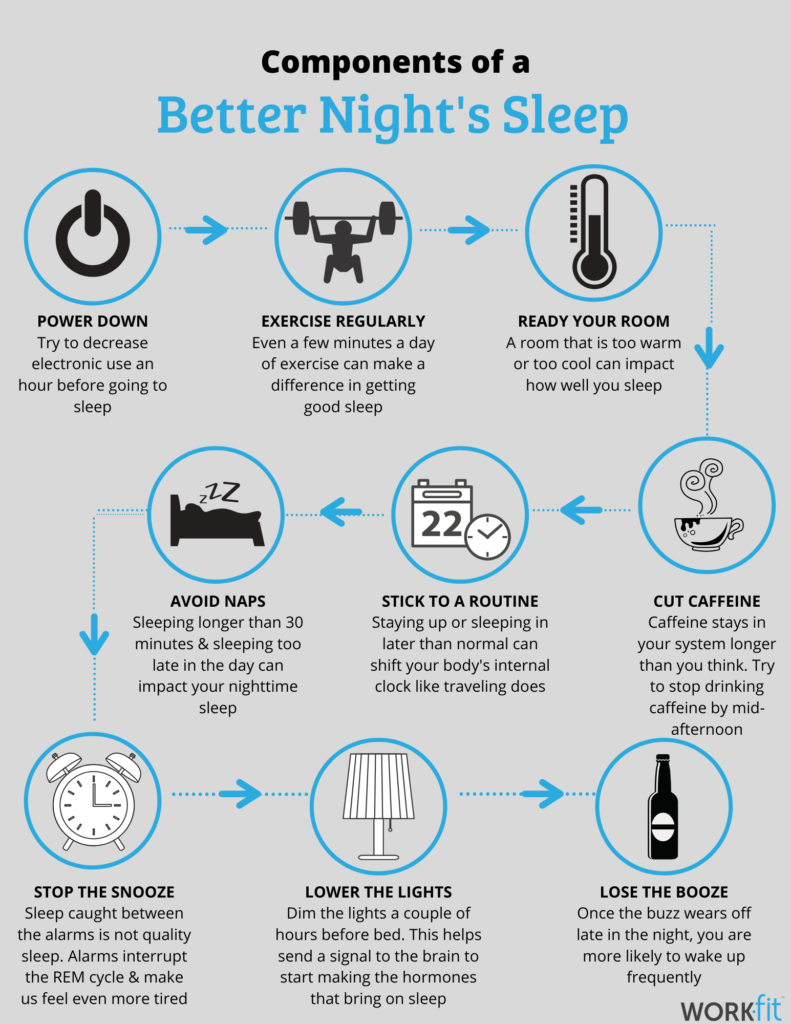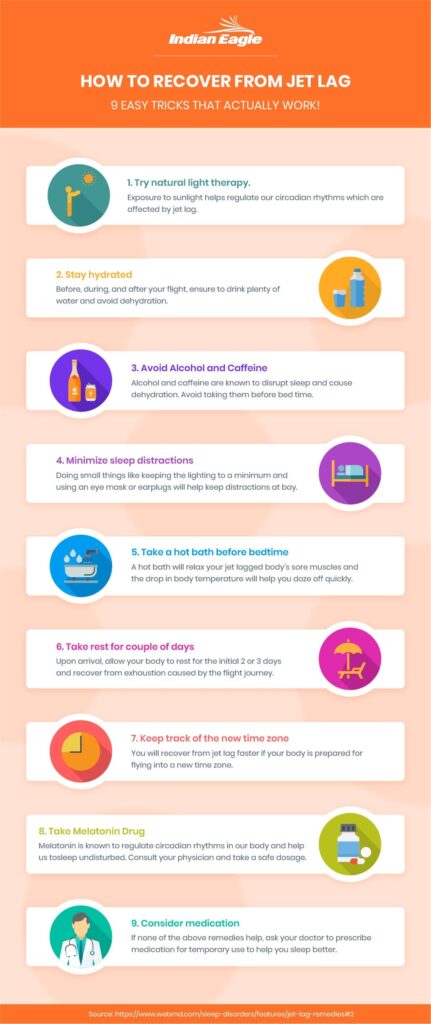In this article, we will explore some effective strategies to minimize jet lag and help you adjust to a new time zone more smoothly. You will discover practical tips and techniques to make your travel experience less exhausting and more enjoyable. From adjusting your sleep schedule to staying hydrated, we will cover a range of strategies to help you combat jet lag effectively. So, if you’re ready to say goodbye to those groggy and disoriented days after traveling, let’s dive in and explore these helpful tips together.

This image is property of www.sleepscore.com.
How to Minimize Jet Lag with These Tips
Jet lag is a common phenomenon that many travelers experience when they cross multiple time zones in a short period of time. It can leave you feeling tired, groggy, and disoriented, which can significantly affect your ability to enjoy your travels. Fortunately, there are several strategies you can implement to minimize the effects of jet lag and ensure a smooth transition into your new time zone. In this article, we’ll explore various tips and techniques that can help you combat jet lag and make the most out of your adventures.
Understanding Jet Lag
Before we delve into the strategies, it’s important to understand what jet lag actually is. Jet lag, also known as desynchronosis, is a temporary sleep disorder that occurs when your body’s internal clock, or circadian rhythm, is disrupted due to rapid travel across different time zones. This disruption can affect various bodily functions, including your sleep-wake cycle, digestion, and energy levels.
Causes of Jet Lag
Jet lag is primarily caused by the rapid adjustment your body has to make when you cross multiple time zones. Your internal clock relies on natural cues, such as sunlight and darkness, to regulate your daily routines. When you travel by air and rapidly change time zones, your body struggles to adjust to the new schedule, resulting in jet lag.
Symptoms of Jet Lag
The symptoms of jet lag can vary from person to person and may include fatigue, insomnia, difficulty concentrating, irritability, digestive issues, and general malaise. These symptoms can make it challenging to enjoy your travels and can even affect your productivity during important trips.
To minimize the effects of jet lag, it’s important to implement strategies that prepare your body for travel, help you adjust to the new time zone, ensure quality sleep, and manage stress and anxiety. Let’s explore these strategies in detail.
Preparing for Travel
Planning Your Schedule
One effective way to minimize jet lag is to gradually adjust your schedule to match the time zone of your destination a few days before your trip. By gradually shifting your sleep and meal times, your body can begin to adapt to the new time zone, making the transition smoother once you arrive.
Adjusting Your Sleep Pattern
Another key factor in minimizing jet lag is adjusting your sleep pattern. If you’re traveling east, try going to bed one hour earlier for a few nights before your trip. If you’re traveling west, go to bed one hour later. This will help your body gradually adjust to the time zone you’ll be entering.
Hydrating Before the Flight
Drinking plenty of water in the days leading up to your flight can help keep your body hydrated and prepare it for the stresses of travel. Airplanes tend to have dry cabin air, which can increase dehydration. By hydrating well before your flight, you’ll help your body stay healthy and better equipped to handle jet lag.

This image is property of uploads-ssl.webflow.com.
During the Flight
Stay Hydrated
While on the flight, it’s essential to stay hydrated by drinking plenty of water. Avoid alcoholic beverages and caffeine, as they can dehydrate your body and disrupt your sleep patterns even further. Opt for water or herbal tea instead to keep yourself refreshed and hydrated.
Avoid Alcohol and Caffeine
Although it may be tempting to indulge in a glass of wine or a cup of coffee during the flight, alcohol and caffeine can have negative effects on your sleep quality and contribute to jet lag symptoms. It’s best to save these beverages for later and focus on hydrating your body with water instead.
Move and Stretch
Sitting for long periods during a flight can cause muscle stiffness and reduce blood circulation, which can contribute to jet lag symptoms. Combat this by getting up and moving around the cabin periodically. Stretching your legs, walking up and down the aisle, or doing simple exercises in your seat can help improve blood flow and reduce stiffness.
Adjusting to the New Time Zone
Gradually Adapt to Local Time
Upon arrival at your destination, it’s important to make a conscious effort to adjust to the local time as quickly as possible. If it’s daytime, try to stay awake and engage in activities that expose you to natural sunlight. If it’s nighttime, avoid napping and try to stay awake until the local bedtime. This will help your body adapt to the new time zone more effectively.
Get Exposure to Sunlight
Sunlight is a powerful natural cue that helps regulate our internal body clocks. By exposing yourself to sunlight during the day, especially in the morning, you can help reset your circadian rhythm and signal to your body that it’s time to be awake and alert.
Avoid Napping
While it may be tempting to take a nap after a long flight, especially if you’re feeling tired, napping can further disrupt your sleep-wake cycle and make it more difficult to adjust to the new time zone. Instead, try to stay awake until the local bedtime to help your body synchronize with the new schedule.

This image is property of i.dailymail.co.uk.
Sleeping Strategies
Create a Sleep-Friendly Environment
Creating a sleep-friendly environment can greatly improve the quality of your sleep and help minimize the effects of jet lag. Make sure to choose a comfortable and dark space to sleep in, minimize noise disruptions, and use earplugs or a sleep mask if necessary.
Establish a Bedtime Routine
Establishing a consistent bedtime routine can signal to your body that it’s time to wind down and prepare for sleep. This can include activities such as reading a book, taking a warm bath, or practicing relaxation techniques like deep breathing or meditation.
Use Sleep Aids If Necessary
If you’re having trouble falling asleep in the new time zone, you may consider using sleep aids to help regulate your sleep. However, it’s important to use them sparingly and under the guidance of a healthcare professional. Over-reliance on sleep aids can lead to dependency and interfere with natural sleep patterns.
Dietary Considerations
Eat Light and Healthy Meals
To minimize jet lag symptoms, it’s recommended to eat light and healthy meals during your travels. Opt for foods that are easy to digest and provide essential nutrients to support your overall well-being. Lean proteins, fruits, vegetables, and whole grains are excellent choices for maintaining energy levels and aiding digestion.
Avoid Heavy Meals Before Sleep
Consuming heavy, greasy, or spicy meals before bedtime can disrupt your sleep quality and make it more challenging to adjust to the new time zone. Try to eat your last meal at least a couple of hours before sleep to allow your body enough time to digest.
Choose Foods That Promote Sleep
Certain foods can help promote sleep and support healthy circadian rhythms. Foods like bananas, almonds, tart cherries, and chamomile tea contain natural sleep-promoting compounds and can be beneficial in helping you fall asleep and stay asleep.

This image is property of www.indianeagle.com.
Exercise and Physical Activity
Engage in Regular Exercise
Regular exercise has countless benefits for overall health and well-being, including improved sleep quality and reduced symptoms of jet lag. Engaging in physical activity during your travels can help regulate your circadian rhythm, boost your energy levels, and enhance your mood.
Utilize Relaxation Techniques
In addition to exercise, utilizing relaxation techniques can be highly beneficial in minimizing the effects of jet lag. Techniques such as deep breathing exercises, progressive muscle relaxation, and guided imagery can help calm your mind and prepare your body for restful sleep.
Try Yoga or Stretching
Yoga and stretching are excellent ways to relax your body and mind, especially before bedtime. Gentle stretching exercises and yoga poses can help release tension, improve blood flow, and promote a sense of relaxation, making it easier to fall asleep and stay asleep.
Managing Stress and Anxiety
Practice Mindfulness and Meditation
Mindfulness and meditation practices are powerful tools for reducing stress, anxiety, and jet lag symptoms. By focusing your attention on the present moment and engaging in deep breathing exercises, you can calm your mind, lower your stress levels, and improve your overall well-being.
Control Your Breathing
One simple yet effective technique for managing stress and anxiety is controlling your breathing. Practice slow, deep breaths to activate your body’s relaxation response, which can help alleviate jet lag symptoms and promote a sense of calmness.
Manage Travel-Related Stressors
Travel can sometimes be stressful, especially when dealing with time constraints, crowded airports, and delayed flights. To minimize the impact of travel-related stress on your body, make sure to plan ahead, allow for extra time, and remain flexible in case of unexpected changes. Being prepared and having a positive mindset can help alleviate stress and make your travel experience more enjoyable.

This image is property of blog.turkishairlines.com.
Stay Awake with Smart Strategies
Get Natural Sunlight Exposure
Exposure to natural sunlight is not only important for adjusting to a new time zone but also for staying awake and alert during the day. If you feel yourself becoming drowsy, try to spend some time outdoors, take a walk in the sun, or sit near a window to get a natural boost of energy.
Stay Engaged with Activities
Staying engaged and active during the day can help prevent drowsiness and maintain your alertness. Engage in social activities, explore your surroundings, or participate in stimulating activities to keep your mind and body engaged.
Take Short Power Naps if Needed
While napping during the day is generally discouraged, taking short power naps can be beneficial in replenishing your energy levels and combating fatigue. Limit your nap duration to 20-30 minutes and make sure to set an alarm to avoid oversleeping and disrupting your nighttime sleep.
Conclusion
By implementing these tips and strategies, you can significantly minimize the effects of jet lag and enjoy your travels to the fullest. From preparing for the journey, adjusting to the new time zone, and prioritizing quality sleep, to managing stress and staying engaged with your surroundings, these techniques will help you make a smooth transition into different time zones and make the most of your jet lag-free adventures. Bon voyage!










